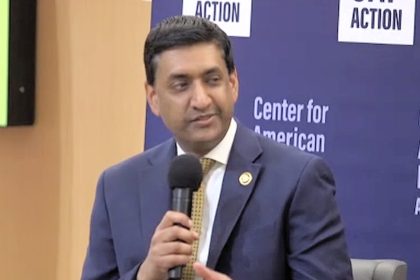Landmark Bills Offer Decarbonization Funding but Cities Not Ready

WASHINGTON — The effort to mitigate climate change, reduce greenhouse gases, and decarbonize is a national priority of many countries, but since the transportation, building, and electricity sectors produce nearly two-thirds of GHG emissions in the United States alone, it’s clear that cities are going to be a vital proving ground for U.S. sustainability targets.
Policy reforms, new technologies, and capital investments are main requirements for achieving transformational change, but despite historic federal investment in these areas, Washington cannot achieve its goals alone.
“Congress is taking historic actions,” Rep. Scott Peters, D-Calif., said at a Brookings Institution meeting about accelerating city climate planning, “but states and localities will be essential.”
“Clean energy transition projects are needed,” he added. “If we fail to do so we will lose most of the benefits of the Inflation Reduction Act.”
The IRA is just one of a trio of landmark bills — including the Infrastructure Investment and Jobs Act and CHIPS and Science Act — that invests billions of dollars across a range of programs to reduce emissions and support new technologies that decarbonize the built environment.
This once-in-a-generation federal funding opportunity may be missed, however, if cities aren’t ready to step up to the challenge.
“The administration will be creating a number of grant programs. States and cities need to have their plans ready to go so these monies can go to the highest impact projects,” Peters stressed.
“And local governments that can clearly show how the funding can present a better future will be in a better position to secure that funding.”
But a new report from Brookings suggests that gaps and deficiencies in city climate planning could hinder or derail national objectives.
“Many cities aren’t ready,” Joe Kane, a fellow at Brookings’ Metro program, said. “Cities are drafting climate action plans — there are literally thousands of plans among cities — but [they] fail to specify detailed actions.”
“The problem is not a lack of pledges and plans. The problem is cities are having trouble moving beyond these pledges and plans.”
In a study of the comprehensive decarbonization plans of 50 of the country’s largest cities, Kane and his co-authors found that almost every one lacked detail on funding and financing, with most not even developing cost estimates for their projects.
“Cities don’t always have the money to execute on their plans,” he said, suggesting that it may be hard to secure funding from federal grant programs if they cannot offer a budget and scope for projects.
Equity and environmental justice omissions were also worrying. Kane admitted that “few [city plans] spell out detailed actions to deliver it.”
“Nearly every plan has clear [decarbonization] targets but no detailed benchmarks,” Kane said, and only a little more than half provide any designation or clearly commit an entity or collection of departments to own decarbonization planning.
“Decarbonizing the built environment is already challenging and our [bureaucracies] only add to the challenge,” Kane said.
“We cannot leave climate action up to chance,” he added. “[Neither Washington] nor cities [can] go it alone, but planning for the sake of planning is not good enough either.”
Suggestions from the Brookings report include honestly assessing cities’ current capacity to decarbonize, establishing regional leadership to coordinate a strategy, developing a skilled workforce to manage decarbonization efforts, standardizing climate data and measurement and establishing clear funding sources.
Kate can be reached at [email protected]
























